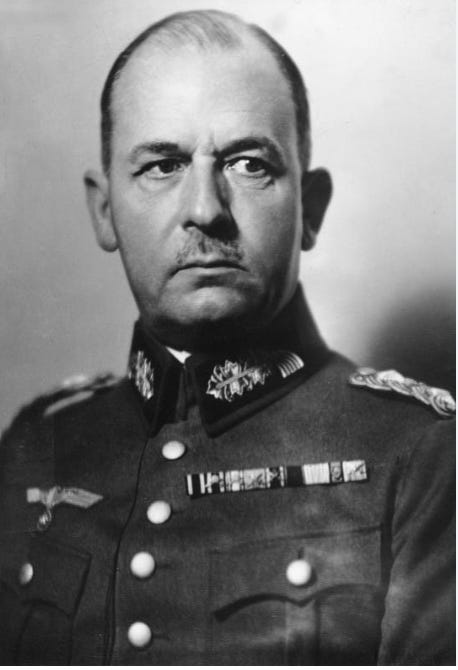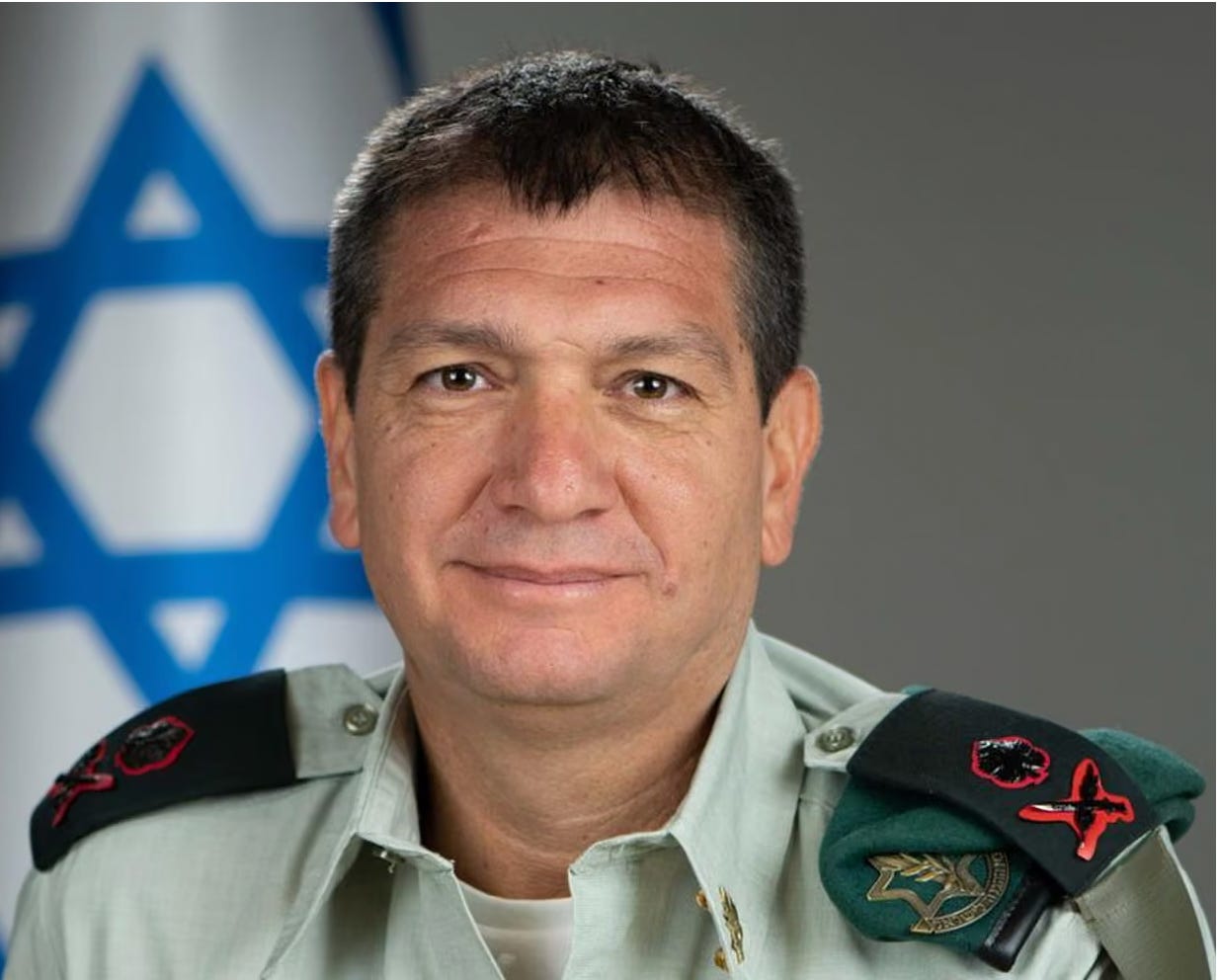Have the Nuremberg Trials Been Forgotten?
Former chief of Israeli military intelligence, Aharon Haliva, called for the reprisal killing of 50 Palestinians for every one Israeli.
This evening I listened to an interview with Professor Jeffrey Sachs in which he quoted a leaked audio recording in which former chief of Israeli military intelligence, Aharon Haliva, can be heard saying,
For everything that happened on October 7th, for every person on October 7, fifty Palestinians must die. It doesn’t matter now if they are children.
I initially thought that Professor Sachs must be mistaken, but then I saw that the leaked audio recording was played by Israel’s Channel 12 TV station, and that General Haliva—who was fired for his military intelligence failure—does not dispute that he made the statement, though he claims it was quoted out of context.
I wondered if General Haliva is familiar with the United States v. Wilhelm List, et al.,—the seventh of twelve subsequent Nuremberg trials conducted by the U.S. military after World War II. The trial, which took place from July 1947 to February 1948, prosecuted German military leaders, including Field Marshal Wilhelm List, for taking and executing hostages, particularly from civilian populations.
Of special interest to the prosecutors was the German military practice of reprisal killings, including the execution of hostages, often at a ratio of 100 civilians for every German soldier killed. German commanders claimed that these actions were necessary reprisals to maintain order and deter resistance. They regarded the Serbs with special contempt. Austrian-born General Franz Böhme encouraged his soldiers to take revenge for the Serbian assassination of Austrian Archduke Franz Ferdinand in 1914.
General Haliva employed a similar line of reasoning when he declared of the Palestinians: “They need a Nakba every now and then to feel the price” —referring to the expulsion of around 700,000 Palestinians from their homes and lands after the creation of Israel in 1948. “Nakba” means catastrophe in Arabic.
Reflecting on this lamentable state of affairs made me think of my literature professor, Saul Bellow, when I was in graduate school at Boston University in 1994. Because space was limited, the Nobel laureate interviewed those who wished to take his class.
I prepared for mine by reading several of his books, including his memoir of visiting Israel in 1975 titled To Jerusalem and Back. I found it a fascinating and entertaining book about the enormous tensions within Israeli society about its attempt to build a modern Jewish state in the ancient Holy Land. As he memorably put it:
Israel is both garrison state and a cultivated society, both Spartan and Athenian. It tries to do everything, to understand everything, to make provisions for everything. All resources, all faculties are strained. Unremitting thought about the world situation parallels the defense effort. These people are actively, individually involved in universal history. I don’t see how they can bear it.
Some of the Israelis he encounters point that most nation states were born out of conquest. I recently thought of this while visiting the old house that once belonged to my great grandmother. It seemed like yesterday that I was a little boy visiting her in her living room, and I marveled at the fact that she was born just twenty years after the U.S. government illegally seized the Black Hills of South Dakota and Wyoming from the Sioux nation after the same government pledged this land to these people.
The motive for seizing it back was the discovery of gold in the hills. As the Supreme Court notably remarked in its 1980 review of this event (US v Sioux Nation), “a more ripe and rank case of dishonorable dealings will never, in all probability, be found in our history.” During Bellow’s 1975 Jerusalem visit, he meets Israelis who express similar sentiments about the Israeli state’s treatment of the Palestinians.
I can’t say that I got to know Professor Bellow well, though he seemed to take a vague shine to me. I think he appreciated my willingness to challenge his extremely dim view of the intellectual state of American students in 1994. Once, in response to his crotchety statement that “young people these days have no serious interest in serious literature,” I replied, “Well sir, we did sign up for your class and endure your unpleasant interview so that we could learn from you,” which caused him to burst out laughing.
In the matter of the latest Israeli-Palestinian conflict, I suspect he would be heavily biased in favor of Israel, but still deeply appalled by the statement of former Israeli General Aharon Haliva about the need for fifty to one reprisal killings. Professor Bellow occasionally expressed admiration for pre-Nazi German culture and literature, and he understood how a nation’s reputation can be stained by the atrocious conduct of bad leaders and military officers.





I think you need to remember what he saw. What many Israelis saw.
The clips came in. It was like 9/11—only worse. Women raped. Breasts cut. Heads chopped off.
A baby cut from a pregnant woman’s body. A man’s head severed with a shovel. An eye pierced with a gun.
The two ginger babies, the Bibas, with their mother. The fear on her face still haunts me.
Then the texts started. Family. Two second cousins at the Nova Festival—injured. Their friends kidnapped.
One came back on Monday, in the last release of hostages. His name was Ochana.
Another young second cousin—his best friend kidnapped. Her name was Eden Yerushlami. A beautiful girl. Held for months. Just to be murdered by Hamas with seven other hostages.
People talked about leveling Gaza. Writing these lines makes me want to scream. I couldn’t sleep. Could not function for months. Traumatized.
Haliva saw it with his own eyes. Not clips. Not videos. His own eyes. He smelled death. Saw the bodies. And also knew he failed.
Do you remember 9/11? I do. We bombed the countries we thought hid Bin Laden.
October 7th in America? 41,000 dead in one day. About 8,500 kidnapped. No president—even Obama—would let that slide. Mexico? Flattened in days.
Haliva failed, yes. His assessment was dead wrong. But he spoke from raw pain. Just as anyone would if it happened to their country.
Facts matter. Israel did not kill indiscriminately. Did not carpet-bomb. Did not target children. Did not do what America, England, or Canada did in war.
The IDF warned people. Leaflets. Calls. Texts. We don’t put people on trial for what they said in pain. Only for what they did.
Israel fights savages. People who enter homes. Torture children in front of their parents. Tie them up. Burn them alive. Civilians joined—looting, raping, burning. They don’t deserve a text message.
Go on Telegram. Watch what Hamas posted. Images replaying in my mind for weeks.
Haliva saw it with his own eyes. Not clips. Not videos. His own eyes.
I’m sure the Americans who arrived at the concentration camps said things worse than Haliva.
I'm sure that our own military officials arriving to the 9/11 sites said worse things.
No one was there to record them. No one to smear their name.
Well, John, how do you propose to eliminate the Jew hatred that has infected those who live in Gaza and perpetrated the Oct 7 massacre?